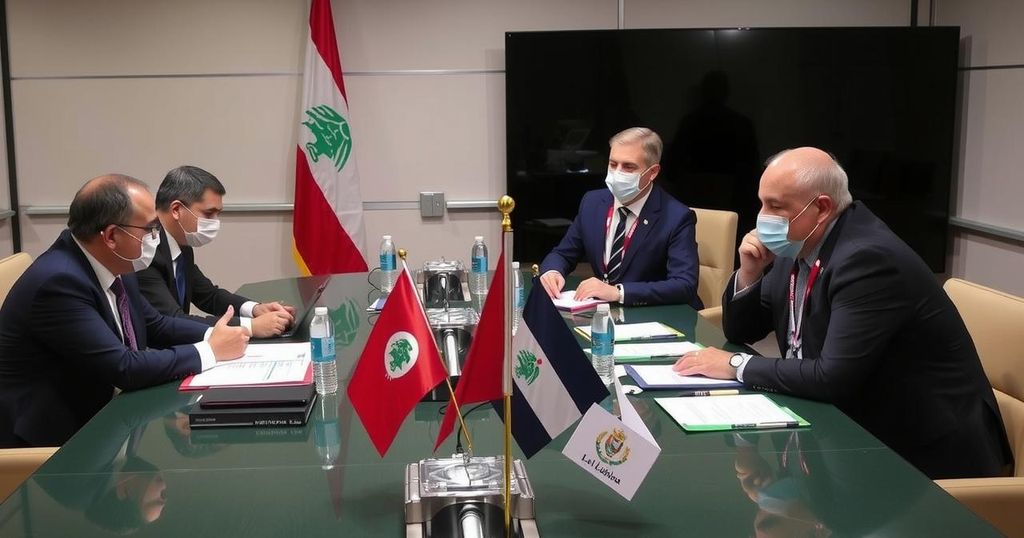Lebanon Leaders Engage in Discussions Ahead of Presidential Elections
The Lebanese political elite are currently in discussions as they prepare for a parliamentary session aimed at electing a new president, following over two years without presidential leadership. General Joseph Aoun emerges as the frontrunner candidate amidst significant political divisions that persist among factions. External diplomatic pressures have intensified, urging leaders to reach consensus to address the economic turmoil facing the nation.
Lebanese political leaders engaged in discussions on Wednesday, just one day prior to a parliamentary session dedicated to electing a new president. Despite the ongoing challenges faced by the Shiite Muslim group Hezbollah due to ongoing warfare, the prospects of reaching a consensus remain uncertain. Lebanon has been without presidential leadership for over two years, resulting in a deepening economic and political crisis that has amplified divisions among political factions.
General Joseph Aoun is regarded as the leading candidate to succeed Michel Aoun, whose presidency concluded in October 2022. Supporters believe that General Aoun could effectively manage the Lebanese army’s deployment in southern Lebanon, especially following a ceasefire agreement that mandated Hezbollah’s withdrawal from border areas, effectively removing its militants in favor of the national army. Nevertheless, the ruling class in Lebanon has historically reached a preliminary agreement on a candidate before a successful parliamentary vote occurs, and various factions remain divided over Aoun’s candidacy.
External pressures are mounting for Lebanon’s leaders to select a president, with French envoy Jean-Yves Le Drian encouraging all parties to act swiftly in filling the vacant presidential position, which he asserts is vital for revitalizing Lebanese governance structures. Additionally, U.S. envoy Amos Hochstein underscored the importance of seizing the current ceasefire between Israel and Hezbollah to achieve political unity among Lebanon’s leaders.
Support for Joseph Aoun appears to derive primarily from the United States, with both France and Saudi Arabia offering backing to a lesser extent. While discussions around prioritizing reforms and establishing a new president for socioeconomic recovery continue, skepticism remains regarding potential factions supporting Aoun, given the historical context of Lebanon’s political landscape.
Lebanon’s caretaker Prime Minister Najib Mikati expressed optimism concerning the presidential election, indicating a belief that the session could yield a successful outcome. However, concerns remain regarding bipartisanship support, predominantly from Christian parties which traditionally play a significant role in the selection process under Lebanon’s multi-confessional political framework.
Ultimately, as Lebanon contemplates its future, many citizens express hope that the new president will align with the aspirations of the populace rather than solely reflecting the interests of political dynasties or foreign influences. A notable sentiment echoed within the community encapsulates the desire for an elect who genuinely represents the Lebanese people’s hopes for recovery from prolonged crises.
The context surrounding the election of a new president in Lebanon stems from a significant political and economic crisis that has beset the nation for several years. The political landscape is fragmented, with deep ideological divides primarily centered around the influence of Hezbollah, a powerful Shiite Muslim political and military entity. The current political deadlock has persisted since Michel Aoun’s presidency ended in 2022. The situation is further complicated by external diplomatic pressures from nations such as France, the United States, and Saudi Arabia, all advocating for governmental reforms to address the severe financial instability that intensified after the 2019 crisis.
In conclusion, the ongoing negotiations among Lebanese leaders for the election of a new president underscore a critical juncture in the nation’s political pathway. With General Joseph Aoun positioned as the primary candidate, consensus remains elusive amidst varying party interests and historical divides. The discussions are further complicated by external influences striving for stability in Lebanon. The outcome of the upcoming parliamentary session will prove pivotal in determining not only the political future of Lebanon but also its potential recovery from an enduring economic crisis.
Original Source: www.barrons.com




Post Comment